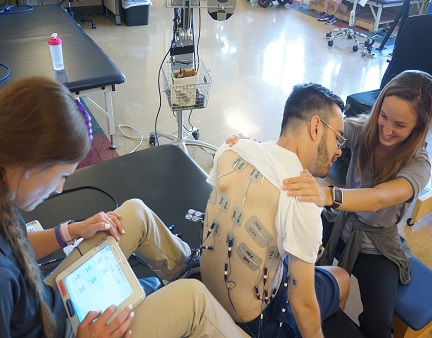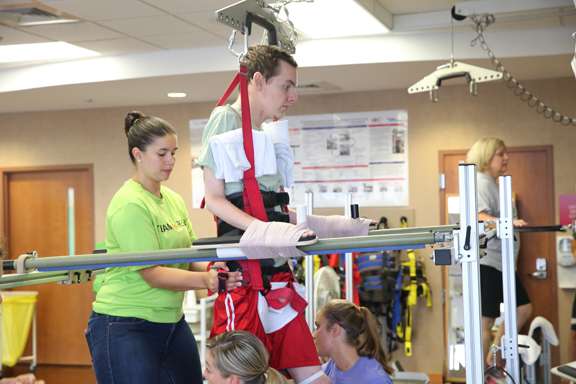 Translational Research Programs Translational Research Programs
Translational Research at KSCIRC is organized into four foundational programs that bridge the worlds of Basic Research and Clinical Trials: Adult NeuroRecovery: Operating under the emerging truth that the human spinal cord is just as smart as the brain, Locomotor Training and Neuromuscular Electrical Stimulation are foundational techniques used to access spinal cord intelligence. Our globally recruited scientific leaders conduct leading-edge research to enable the recovery of function and movement in adults with spinal cord injuries. Epidural Stimulation: KSCIRC studies are revealing that spinal cord Epidural Stimulation (scES) achieved by surgically implanting an electrode array over the lower spinal cord can activate specific neural circuits. Achievements in this program have enabled an FDA-approved prospective 36-patient, six-year randomized trial. Pediatric NeuroRecovery:Targeting recovery after spinal cord injury in children of ages 18 months to 17 years, novel outcomes far beyond expectations of “standard care” are being achieved as children not expected to ever get better are getting better. Our scientifically-based therapies capitalize on emerging knowledge of a ‘smart’ spinal cord capable of learning. For children and their families, it is a place where KIDS KICK PARALYSIS. Learn More about our Translational Research Programs The Translational Research scientific cores focus on the areas impacted most profoundly by spinal cord injuries. Our globally-recruited scientific leaders design and conduct cutting-edge research to investigate and promote the recovery of function in various anatomical systems. These scientific cores are: Neuromusculoskeletal & Metabolic: mapping the neuronal circuits that connect the anatomical components of the human body is helping to develop safer, more effective interventions that support and restore the ability to stand and walk Cardiovascular & Pulmonary: performing innovative assessments of cardiovascular and pulmonary function is helping develop interventions that overcome dysfunctions that can limit physical activity, including participation in activity-based therapies Human Locomotion & Movement Performance: analyzing how the human body moves through space and responds to gravity is helping to develop better interventions and enable better recoveries Urogenital & Bowel: studying the enteric nervous system, our “second brain,” is helping to reduce dependence on pharmaceutical and physical interventions needed to maintain health of the urinary, digestive and reproductive systems Neuro-Physiology & Neuro-Imaging: providing physiological assessments and magnetic resonance imaging delivers critical data that are helping to quantify the impact of our interventions Engineering: developing new devices for imaging and measuring and providing bioinformatic analytics are helping to provide new insights that enable improvements in therapies and methods of delivery Learn More about our Translational Science Cores The translational research support cores provide the infrastructure that allows the conduct of rigorous and innovative science. Guiding principles are to champion victory over paralysis, act responsibly and ethically, maintain compliance and to always strive for excellence. These support cores are: Database & Information Management: responsible for organizing, storing, and retrieving data; ensuring secure portals for communications with current and potential research participants; and readily demonstrating Health Insurance Portability and Accountability Act (HIPAA) and regulatory compliance Clinical Analytics & Outcomes Research: responsible for analyzing the therapeutic interventions developed at KSCIRC in terms of effectiveness; examining relevant external data sources; and helping to design therapeutic explorations and interventions Research Medical: responsible for assessing the health and well-being of research participants and for communicating with the scientific cores so that the well being of each participant is safeguarded Regulatory: responsible for interactions with the University of Louisville’s Human Subjects Protection Program Office (HSPPO) to ensure that research involving human participants is conducted in accordance with Federal and State regulations as well as University and sponsoring agency policies and procedures Administrative: responsible for oversight of all programs and projects conducted by the Translational Research group. This includes strategic planning, organizational structure and financial management. Learn More about our Translational Support Cores |
Translational Research at KSCIRC |







